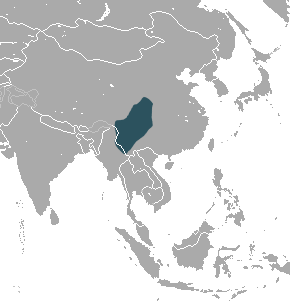
The family Talpidae includes the moles who are small insectivorous mammals of the order Eulipotyphla. Talpids are all digging animals to various degrees: moles are completely subterranean animals; shrew moles and shrew-like moles somewhat less so; and desmans, while basically aquatic, excavate dry sleeping chambers; whilst the quite unique star-nosed mole is equally adept in the water and underground. Talpids are found across the Northern Hemisphere of Eurasia and North America, and range as far south as the montane regions of tropical Southeast Asia.

The shrew moles or shrew-like moles (Uropsilus) are shrew-like members of the mole family of mammals endemic to the forested, high-alpine region bordering China, Myanmar, and Vietnam. They possess a long snout, a long slender tail, external ears, and small forefeet unspecialized for burrowing. Although they are similar to shrews in size, external appearance, and, presumably, ecological habits, they are nevertheless talpids and considered true moles, as they share a full zygomatic arch with all other moles, while this arch is completely absent in shrews.

Romance of the Three Kingdoms is a Chinese television series adapted from the classical 14th century novel of the same title by Luo Guanzhong. The series was produced by China Central Television (CCTV) and was first aired on the network in 1994. It spanned a total of 84 episodes, each approximately 45 minutes long. One of the most expensive television series produced at the time, the project was completed over four years and involved over 400,000 cast and crew members, including divisions of the People's Liberation Army from the Beijing, Nanjing and Chengdu military regions. Some of the dialogue spoken by characters was adapted directly from the novel. Extensive battle scenes, such as the battles of Guandu, Red Cliffs and Xiaoting, were also live-acted.

The gracile shrew mole is a species of mammal in the family Talpidae. It is endemic to China; populations known from Myanmar likely represent other species.

The inquisitive shrew mole is a species of mammal in the family Talpidae. It is only known from Yunnan province of China, although its range is thought to extend over the border into Myanmar.
The 12th Central Committee of the Chinese Communist Party was in session from September 1982 to November 1987. It held seven plenary sessions. It was succeeded by the 13th Central Committee. It elected the 12th Politburo of the Chinese Communist Party in 1982.

Three Kingdoms is a 2010 Chinese television series based on the events in the late Eastern Han dynasty and the Three Kingdoms period. The plot is adapted from the 14th century historical novel Romance of the Three Kingdoms and other stories about the Three Kingdoms period. Directed by Gao Xixi, the series had a budget of over 160 million RMB and took five years of pre-production work. Shooting of the series commenced in October 2008, and it was released in China in May 2010.

The Water Margin is a 1998 Chinese television series adapted from Shi Nai'an's classical 14th-century novel of the same title. It was produced by CCTV with Zhang Jizhong as producer. It was first broadcast in China in January 1998. The series also featured action choreography by Yuen Woo-ping.

All Men Are Brothers is a 2011 Chinese television series adapted from Shi Nai'an's 14th century novel Water Margin, one of the Four Great Classical Novels of Chinese literature. The series is directed by Kuk Kwok-leung and features cast members from mainland China, Taiwan and Hong Kong. The series was first broadcast on 8TV in March 2011 in Malaysia.

Tang Ming Huang is a Chinese television series based on historical events in the reign of Emperor Xuanzong of the Tang dynasty. The series was directed by Chen Jialin and starred Liu Wei as the eponymous emperor. It was first broadcast on CCTV-1 in 1990 in mainland China.

Wu Zi Bei Ge, also known as Wu Zi Bei Ge: Wu Zetian Zhuan, is a 2006 Chinese television series based on the life of Wu Zetian, the only woman in Chinese history to assume the title of "Empress Regnant". The series was directed and written by Chen Yanmin, and starred Siqin Gaowa and Wen Zhengrong as the empress. The series' title Wu Zi Bei Ge literally means "Song of the Uncharactered Stele", with the "stele" referring to the unmarked one standing near Wu Zetian's tomb at the Qianling Mausoleum.
The China Badminton Super League (CBSL) (Chinese: 中国羽毛球俱乐部超级联赛) is the prime National team competition for badminton players in China. The China Badminton Super League was re-launched in 2009 after a failing attempt seven years earlier. Liu Fengyan, director of the Table Tennis and Badminton Administration Center under China's State General Administration of Sport, announced the re-launch during the 50th anniversary meeting of the Chinese Badminton Association.

The Advisors Alliance is a 2017 Chinese two-part television series based on the life of Sima Yi, a government official and military general who lived in the late Eastern Han dynasty and Three Kingdoms period of China. The series starred Wu Xiubo as the main character, with Liu Tao, Li Chen, Janine Chang, Tang Yixin, Yu Hewei and Wang Luoyong playing supporting roles. The first part of the series started airing on Jiangsu TV and Anhui TV on 22 June 2017. The second part started airing on Youku on 8 December 2017.
The equivalent-teeth shrew mole is a species of mammal in the family Talpidae. It is endemic to Sichuan, China. It is characterized by having nine teeth in the row above and nine teeth in the lower row. The data indicate that it is the sister taxon of U. andersoni. Its specific name, aequodonenia, means 'equivalent teeth' in Latin.

The Counsellors' Officeof the State Council is an advisory agency directly under the State Council of People's Republic of China. The Central Institute of Culture and History is a research institute led by the same leadership and located in the same building. They are regarded as the official government think tanks.
The Sound of Happiness is a Taiwanese Hokkien television drama that began airing on SET Taiwan in Taiwan on 26 December 2018, from Mondays to Fridays, and ended its broadcast on 5 August 2020. The series started production on 22 November 2018. The series is aired every weeknight at 8pm and is simulcast one hour later on SET Taiwan's sister channel, SET Drama.
The Snow Mountain shrew mole is a species of mammal in the family Talpidae. It is native to Yunnan Province in China and potentially Myanmar. Its common name references Jade Dragon Snow Mountain, which is the type locality of the species. Aside from there, the only other confirmed specimen is from Cang Mountain.











